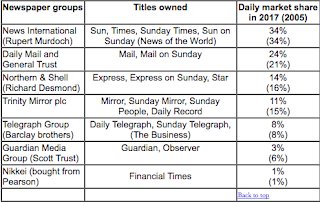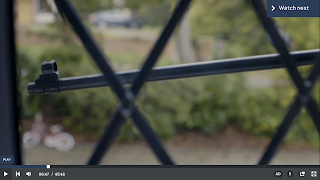Online Algorithms
Some videos on YouTube are created using an algorithm in order to generate content that is popular, and will emerge through auto play. People will use the algorithm in order to make the videos, however the producers are using that algorithm's 'advice' to generate content that will be frequently viewed in order to make money. This means that the videos aren't overly entertaining and sometimes they use children's content mixed with horrible imagery which eventually traumatises innocent children who click on them not realising what they will be, or that are even auto played due to the key words used to describe it. However, the algorithm WORKS - this means there are always going to be clicks which then generate money.
IS ZOELLA USING AN ALGORITHM?
- The use of brands in the title of her videos as well as the thumbnails in order to generate more clicks as they are popular
- Zoella's face in every thumbnail is almost identical, always a smile and it makes her recognisable and appealing
- Same cursive font used in every thumbnail connoting to simplicity and laidback attitudes, quite cutesy
- Use of her name at the end of each title not only brings up her channel, but also the videos, which means that people are much more likely to click without searching and therefore generates more vies and money
- makes Zoella hyperreal
Using an algorithm is a highly manipulative way of getting people to watch videos. This is because people are consciously using the algorithms purely to make sure that the videos are constantly seen and clicked on. They don't necessarily make content that they like, but content that they think will get views. It isn't really authentic.
It is not only the producers who use algorithms in order to create content, but it is also the platforms on which you use them. For example, Instagram and Facebook use them in order to see what content you, the audience, engages with, and then generates what content to further show you in your feed. Netflix also uses similar algorithms to find films and TV shows that appeal to you by figuring out who you are - if you're black, middle class, gay, straight or male. They will alter thumbnails in order to appeal to you and also organise titles and genres to what they see you most commonly watching.
This makes the internet highly hyperreal. There is no longer an audience - there is just data and algorithms and more ways to make and keep people watching in order to increase profit. By using computer logic, platforms and producers are targeting a collection of data that will generate them the most money.
Something that could link to this is clickbait. These are adverts or articles that use random photographs anchored by crazy, algorithm-generated titles which are supposed to make people more likely to click on them. Most of the time, they are low quality and badly laid out, and rely on the title alone to attract an audience. Clickbait titles are hermeneutic and this means that people want to know more. It works due to curiosity of the unknown.
Guillaume Chaslot, a former YouTube algorithm engineer, pointed out that platforms like YouTube exploit people into watching certain content and have begun to try and create hyper-engagement within their videos. This has led to YouTube demonetising some conspiracy videos as they are influence people in a much stronger way - especially people with mental health issues and people who are vulnerable.
Social media is regulated by OFCOM, however it doesn't actively regulate sites, they self regulate through guidelines set by OFCOM. If the government wanted to create a better regulatory framework, this would mean establishing a regulator to provide guidance on how to spot and minimise the harms social media presents, as well take enforcement action when warranted. These enforcement actions must be supported by a strong sanctions regime in order to be effective. (quoted from https://www.parliament.uk/business/committees/committees-a-z/commons-select/science-and-technology-committee/news-parliament-2017/impact-of-social-media-young-people-report-published-17-19/)
IS ZOELLA USING AN ALGORITHM?
- The use of brands in the title of her videos as well as the thumbnails in order to generate more clicks as they are popular
- Zoella's face in every thumbnail is almost identical, always a smile and it makes her recognisable and appealing
- Same cursive font used in every thumbnail connoting to simplicity and laidback attitudes, quite cutesy
- Use of her name at the end of each title not only brings up her channel, but also the videos, which means that people are much more likely to click without searching and therefore generates more vies and money
- makes Zoella hyperreal
Using an algorithm is a highly manipulative way of getting people to watch videos. This is because people are consciously using the algorithms purely to make sure that the videos are constantly seen and clicked on. They don't necessarily make content that they like, but content that they think will get views. It isn't really authentic.
It is not only the producers who use algorithms in order to create content, but it is also the platforms on which you use them. For example, Instagram and Facebook use them in order to see what content you, the audience, engages with, and then generates what content to further show you in your feed. Netflix also uses similar algorithms to find films and TV shows that appeal to you by figuring out who you are - if you're black, middle class, gay, straight or male. They will alter thumbnails in order to appeal to you and also organise titles and genres to what they see you most commonly watching.
This makes the internet highly hyperreal. There is no longer an audience - there is just data and algorithms and more ways to make and keep people watching in order to increase profit. By using computer logic, platforms and producers are targeting a collection of data that will generate them the most money.
Something that could link to this is clickbait. These are adverts or articles that use random photographs anchored by crazy, algorithm-generated titles which are supposed to make people more likely to click on them. Most of the time, they are low quality and badly laid out, and rely on the title alone to attract an audience. Clickbait titles are hermeneutic and this means that people want to know more. It works due to curiosity of the unknown.
Guillaume Chaslot, a former YouTube algorithm engineer, pointed out that platforms like YouTube exploit people into watching certain content and have begun to try and create hyper-engagement within their videos. This has led to YouTube demonetising some conspiracy videos as they are influence people in a much stronger way - especially people with mental health issues and people who are vulnerable.
Social media is regulated by OFCOM, however it doesn't actively regulate sites, they self regulate through guidelines set by OFCOM. If the government wanted to create a better regulatory framework, this would mean establishing a regulator to provide guidance on how to spot and minimise the harms social media presents, as well take enforcement action when warranted. These enforcement actions must be supported by a strong sanctions regime in order to be effective. (quoted from https://www.parliament.uk/business/committees/committees-a-z/commons-select/science-and-technology-committee/news-parliament-2017/impact-of-social-media-young-people-report-published-17-19/)



Comments
Post a Comment